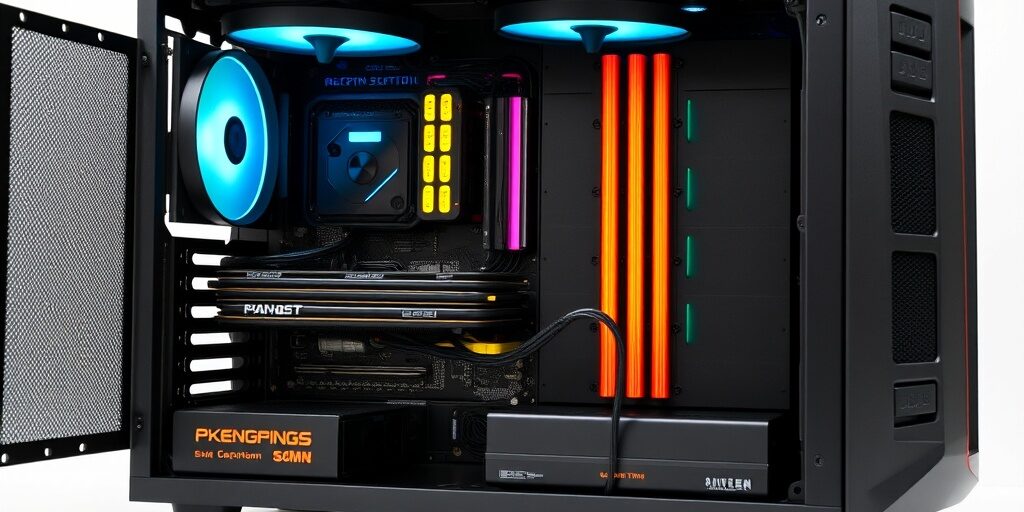Building a custom gaming PC is one of the most fulfilling ways to achieve a tailored gaming experience. Unlike pre-built systems, custom PCs let you select every component, ensuring the perfect balance of performance, aesthetics, and budget.
In this guide, we’ll explore the benefits of building your own gaming PC, the key components required, and step-by-step instructions to bring your dream rig to life. Whether you’re a novice or an experienced builder, this article covers everything you need to know.
Why Build a Custom Gaming PC?
Customising your gaming PC offers several advantages over purchasing a pre-built system:
- Performance Control: Select components optimised for your favourite games.
- Cost Efficiency: Save money by avoiding unnecessary features.
- Upgrade Flexibility: Future-proof your system for easy upgrades.
- Personalisation: Create a setup that reflects your style.
Essential Components for a Custom Gaming PC
1. CPU (Central Processing Unit)
What Does the CPU Do?
The CPU handles core computations, affecting game performance, frame rates, and multitasking capabilities.
Tips for Choosing a CPU:
- Opt for a high-core-count processor for modern gaming.
- Popular choices include Intel’s Core i5/i7 and AMD’s Ryzen 5/7 series.
2. GPU (Graphics Processing Unit)
Why is the GPU Important?
The GPU is the most critical component for gaming, responsible for rendering images, textures, and advanced graphics.
Tips for Choosing a GPU:
- Choose based on the resolution and refresh rate of your monitor.
- Look for models with ample VRAM (e.g., 8GB or higher for 4K gaming).
3. Motherboard
Role of the Motherboard:
The motherboard connects all components and influences expandability.
Features to Consider:
- Compatibility with your CPU and RAM.
- PCIe slots for the GPU and other peripherals.
4. RAM (Random Access Memory)
What Does RAM Do?
RAM stores temporary data for active tasks, affecting game load times and multitasking.
Tips for Choosing RAM:
- 16GB is the recommended minimum for gaming; 32GB for future-proofing.
- Look for high-speed RAM (e.g., 3200 MHz or above).
5. Storage
Types of Storage:
- SSD (Solid-State Drive): Faster boot and load times.
- HDD (Hard Disk Drive): Budget-friendly for bulk storage.
Recommendations:
- Use an NVMe SSD for your operating system and games.
- Include an HDD for media files and backups.
6. Power Supply Unit (PSU)
Importance of the PSU:
The PSU powers all components, and its quality directly affects system stability.
Tips for Choosing a PSU:
- Ensure it provides sufficient wattage for your build.
- Look for 80 Plus Gold certification for efficiency.
7. PC Case
Role of the PC Case:
The case protects your components and determines airflow and cable management.
Features to Consider:
- Ensure it supports your motherboard size (ATX, Micro-ATX, Mini-ITX).
- Look for ample cooling options and aesthetic features like RGB lighting.
8. Cooling System
Types of Cooling:
- Air Cooling: Cost-effective for most builds.
- Liquid Cooling: Ideal for overclocking and high-performance gaming.
Tips:
- Use additional case fans to optimise airflow.
- Monitor temperatures with software tools.
9. Gaming Peripherals
Key Peripherals:
- Monitor: High refresh rates (144Hz or more) for competitive gaming.
- Keyboard & Mouse: Mechanical keyboards and precision mice enhance performance.
- Headset: Quality audio for immersive gameplay.
Factors to Consider When Building a Gaming PC
1. Budget
Set a realistic budget and allocate funds based on component importance, with the GPU taking the lion’s share.
2. Gaming Goals
Identify your target games and desired settings (e.g., 1080p Ultra, 4K, or VR).
3. Upgrade Potential
Plan for future upgrades by choosing a compatible motherboard and PSU.
Step-by-Step Guide to Assembling Your Custom Gaming PC
- Prepare your workspace and gather tools.
- Install the CPU and cooler onto the motherboard.
- Insert RAM into the appropriate slots.
- Mount the motherboard in the case.
- Connect the PSU, storage, and GPU.
- Cable manage for optimal airflow.
- Install the operating system and drivers.
Common Mistakes to Avoid When Building a Gaming PC
- Skimping on the PSU: A cheap PSU can damage your components.
- Neglecting Cooling: Overheating affects performance and component lifespan.
- Forgetting Compatibility: Double-check all component specs.
- Poor Cable Management: Leads to clutter and restricted airflow.
Conclusion and Call to Action
Building a custom gaming PC is an exciting project that offers unmatched performance and personalisation. By understanding the essential components and avoiding common pitfalls, you can create a rig that delivers an exceptional gaming experience.
At Perth Computer Experts, we specialise in custom PC builds tailored to your needs. Contact us today for expert guidance and assembly services to bring your dream gaming setup to life!




